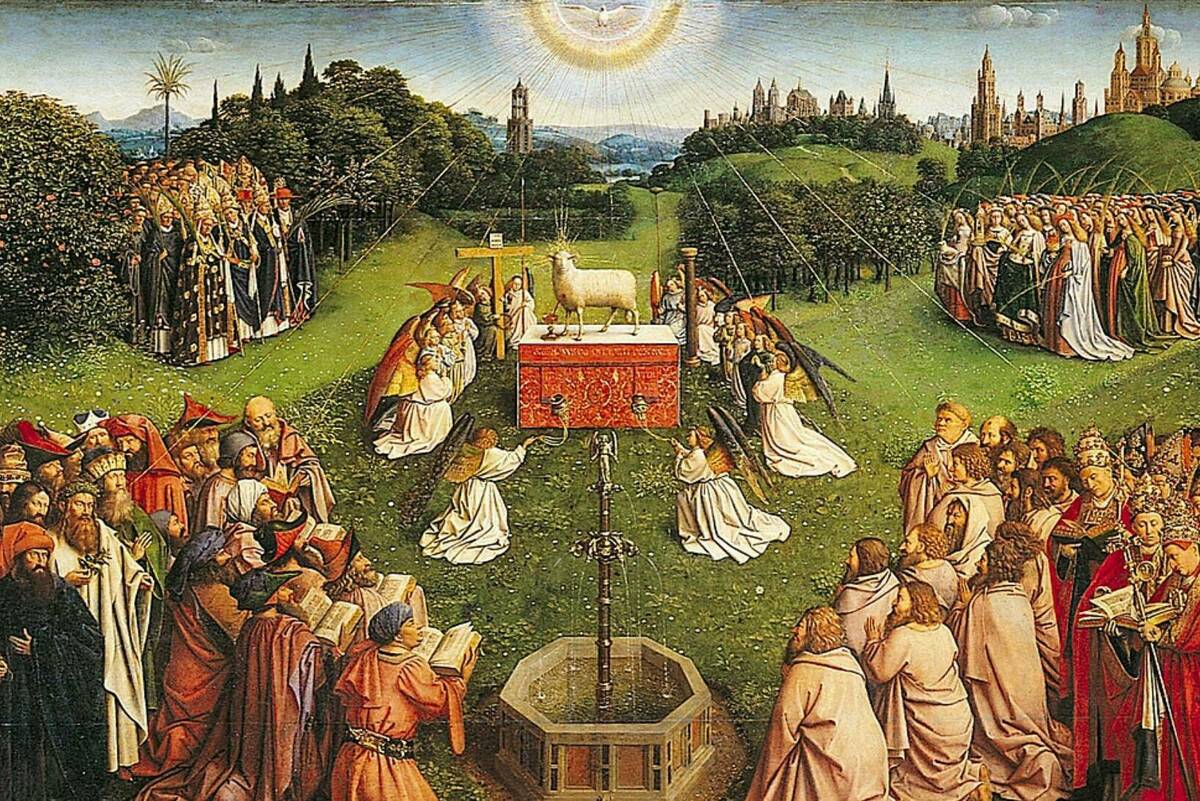The Book of Revelation does not contain a series of esoteric predictions about the end of the world. Rather, Revelation presents a world in which the final union of God and humanity is taking place in the presence of the slain Lamb. This ultimate union is described as a wedding: “I . . . saw the holy city, a new Jerusalem, coming down out of heaven from God prepared as a bride adorned for her husband” (Rev 21:2).
This bridal tradition has a long history in Israel. In the Song of Songs, Israel can meditate upon God’s love through a secular bridal song, functioning as an image of God’s courtship: “You are all-beautiful, my beloved, and there is no blemish in you” (Sg 4:7). God desires with passion to be with Israel. The prophet Isaiah goes further, imagining God as dressing Israel as his beloved bride: “For he has clothed me with a robe of salvation, and wrapped me in a mantle of justice, Like a bridegroom adorned with a diadem, like a bride bedecked with her jewels” (Is 61:10).
Upon the Cross, we learn that it is Jesus who is the Bridegroom we have been waiting for. From the side of the Bridegroom upon the cross flows forth his Bride, the Church born in water and blood (cf. Jn 20:34), in Baptism and Eucharist. The new Adam brings forth the new Eve, the Church, restoring humanity to her nuptial vocation. The wedding feast of Cana is replaced by the Eucharistic banquet of the Cross. Every time we go to Mass, we are attending this wedding. Our wedding. Our nuptial feast.
So, in the Book of Revelation, the final act of this feast is underway. From the throne, the Church hears proclaimed the divinely offered wedding vows, “Behold, God’s dwelling is with the human race. He will dwell with them and they will be his people and God himself will always be with them as their God” (Rev 20:3). Here, the nuptial covenant repeated throughout the Old Testament is spoken once more. God will dwell with us. God loves us.
God’s nuptial love, as the Gospel of John makes clear, is not complete with the individual: “I give you a new commandment: love one another. As I have loved you, so you also should love one another” (Jn 13:34). The love of Christ that has brought the Church into existence, that has enlightened the newly baptized, that feeds the Church with manna from heaven: this love must be given away. This love is the vocation of all humanity.
Whereas romantic love tends to turn a couple inward, God’s eros turns the Christian outward to the world. We are turned outward to make this nuptial love available to every nation on earth, just like Paul and Barnabas. To go to the corners of a globe longing for love.
This nuptial vocation is true for every Christian, married or not. For the married, we are called to create a space in the domestic church for this love, welcoming in all those in need of the fruits of our marriage. For the priest or bishop, their lives are oriented toward this nuptial love expressed in the sacramental life of the Church, given over to the world. The religious become icons of this nuptial love, who live out their bridal vocation to Christ through poverty, chastity, and obedience. Everyone, no matter their age, no matter their vocation, are called to live out this nuptial love for the salvation of the world.
Christ has married us. We are all brides of the one Bride, the Church. Let us delight in his nuptial attention and sing anew with understanding, “For the wedding day of the Lamb has come, his bride has made herself ready” (Rev 19:8).
This article originally appeared in Our Sunday Visitor: Newsweekly on April 13, 2016 and is reproduced here with the permission of the publisher.
Featured Image: Christ of the Apocalypse (ca. 1220), detail: The Wedding Feast of the Lamb; courtesy of Wikimedia Commons.

